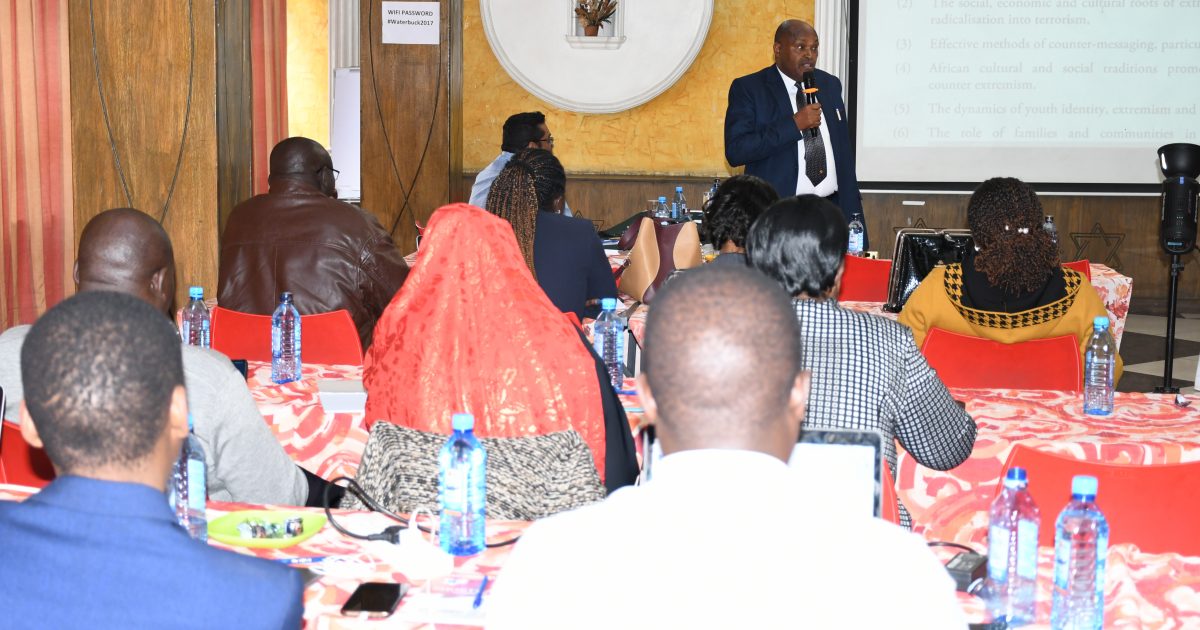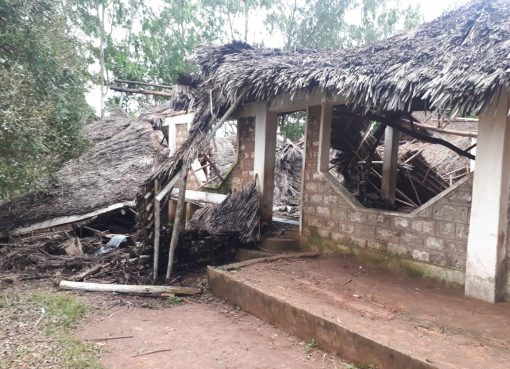The State has effectively responded to the threat of radicalization and violent extremism through promotion of community engagement and community policing that focuses on building trust between members of the public and security agencies.
The National Counter Terrorism Center (NCTC) Head of Prevention and Resilience Mr Njenga Miiri said they have identified community policing as one of the most effective measures to counter radicalization and violent extremism, adding that a secure and safe environment is the shared responsibility of citizens and security agencies.
Miiri made the remarks Wednesday during the regional public participation meeting on reviewing the National Strategy on Countering Violent Extremism held in Nakuru County, which runs from October 18 to 19.
He said that for the past seven years, NCTC has been using a robust, coherent and high-level strategy to counter the two vices, adding that the government was no longer relying exclusively on security aspects to define the scope of intervention in dealing with violent extremism and radicalization.
The NCTC Head of Prevention and Resilience indicated that whereas activities by the State were disrupting the crimes using security and law enforcement means, it was also focusing on strengthening the communities’ initiatives and efforts to resist violent extremism and radicalization.
Miiri observed that NCTC has encouraged active and equal partnerships between citizens and security agencies and this has helped to win hearts and minds of many Kenyans and built resilience against radicalization and violent extremism across the country.
“Our community policing model recognizes that it is impossible to solve public safety problems like radicalism and violent extremism without interactive partnerships between the police and communities,” Miiri said.
“NCTC has been championing the concept that strong police-community relations are a vital foundation for security agencies to identify individuals at risk of radicalization and violent extremism,” he stated.
He stated that the strategy review was timely, as terrorism is a dynamic space where terrorists come up with new strategies in light of changing technology.
The ggovernment, he said, was committed to reviewing and developing an integrated and comprehensive strategy that brings on board different agencies and actors in the fight against the vices.
“We are envisioning a strategy that will take into account the complexity of the drivers of radicalism and violent extremism and help us gain the confidence of relevant communities. Prevention approaches should not be unduly securitized,” he added.
Miiri said the specific action plans for specific counties aim to localize prevention of extremism into precise areas instead of generalizing, noting that different areas have different issues.
“We believe that when we have communities with us, this work will become very easy, we don’t have to have much investment on patrols and operational engagements to save costs and boost other development agenda,” he said.
He noted that radicalism and extremist violence does not simply threaten the peace and stability of Kenyan communities, but it shatters the very social fabric that binds the country together.
By focusing on prevention, Miiri said, NCTC was seeking to address the root causes of violent extremism-be it socio-economic deprivation, political marginalization, or ideological manipulation.
The National Strategy to Counter Violent Extremism under review was launched by former President Uhuru Kenyatta in September 2016.
Miiri underscored the need to adopt the input given by members of the public and urged practitioners in the security space to develop a proactive strategy that would help in prevention as opposed to countering violent extremism in the country.
“With the strategy in place, we believe that it will help to prevent incidents of violent extremism and terror attacks in the region and the country,” he stated.
The Review of the National Strategy for Countering Violence and Extremism is supported by the Global Community Engagement and Resilience Fund (GCERF) in partnership with the National Counterterrorism Centre (NCTC) and Act Change Transform.
It brought together officers from the County Counter Terrorism Committees, civil society organizations, security actors, youth, and faith-based organizations from Rift Valley regions.
According to Miiri, the existing strategy needed an improvement in some of its sections to adapt to the changing times.
Over the years, Miiri observed, the implementation of the strategy, which was developed seven years ago, presented glaring gaps, including lack of a measurability framework that posed a potential threat to the security and peace of the country.
“This strategy is supposed to be a comprehensive mechanism for making sure that we are able to handle all situations, from radicalization for recruitment to possible planning for attacks by violent extremists,” he stated.
According to Pastor Wagalla Hodari, religious radicalization is a growing concern in many parts of the country. He said that while it had been largely associated with the Muslim Community, recent events have shown that even Christian churches can become breeding grounds for extremist ideologies.
While noting that radicalization, extremism, and violence not only pose a threat to national security but also undermine the country’s unity and cohesion, Hodari observed that some churches have adopted extremist teachings that are in direct opposition to mainstream religious beliefs.
This, he added, has resulted in the members going on to perpetrate acts of violence on others and themselves, in the name of seeking God.
“One factor contributing to religious radicalization in Kenya is the unbridled proliferation of churches. In 2016, the Attorney General’s Office published the Religious Societies Rules that made it compulsory for churches to submit a clerics and theological code of conduct and a constitution showing statement of the doctrine of faith,” he added.
Hodari observed that regardless of the freedom of worship provided for in Article 32 of the Constitution, the Shakahola deaths may be a significant pointer to the need to heighten regulation of the church.
“It is important for the Kenyan public to be vigilant in monitoring the activities of religious organizations, and for religious leaders to be held accountable for their teachings. It is only through collective action that we will be able to prevent the tragedies of religious radicalization from occurring,” he noted.
Ms Hamsa Ondieki from ‘Youth bila Noma’ organization stated that in essence, violent extremists use religion as a scapegoat to promote and achieve their selfish goals.
She said the organization had developed anti-radicalization lessons which are aimed at creating awareness on radicalization issues and how the youth can avoid falling into the trap and hands of religious extremists.
“The lessons include de-radicalization messages which are incorporated into social and religious subjects such as Islamic Religious Education and Christian Religious Education. We are building resilience in schools and creating a platform for teachers tackling extremism,” she pointed out.
Ondieki observed that anyone, irrespective of status, can be radicalized adding that religion is an emotive issue and anyone can be vulnerable to mind manipulation.
The best approach, she said, is to empower critical voices in schools and communities who will in turn help in pushing back the influence of violent extremism and radicalization in our schools and communities.
By Anne Mwale





